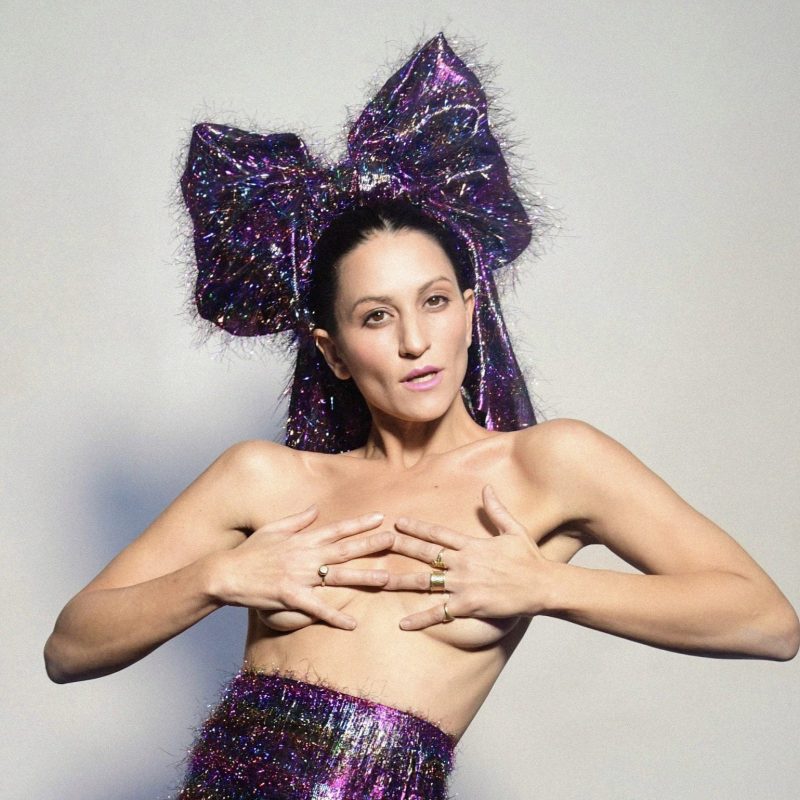
Martina Sorbara, better known as Dragonette, has lived multiple musical lifetimes over the past 15 years. A Juno Award-winning artist and sought-after songwriter, she’s scored chart-topping hits, collaborated with the world’s biggest DJs, and released four albums. Along the way, Dragonette has headlined shows across the globe; supported the likes of Duran Duran, Ke$ha, Major Lazer, and Miike Snow; and played to thousands of fans at Coachella, Electric Daisy Carnival, Glastonbury, and Lollapalooza.
While Dragonette’s evolving sound lands delectably in between pop, new wave, and dance, Sorbara was raised with very different musical influences. “My past is so the opposite of pop music,” the Toronto-based artist recalls. “Until I was 19 or 20, I largely listened to folk and jazz. Between my hippie school and hippie parents, I thought that pop music had no merit. I had no real exposure to it. And so I ignored it because I thought it was music for other people.” After she left high school, all of that changed. “Once I grew up a little and started listening to music outside of my bubble, I realized that all the music I liked was actually pop. It was just decorated differently.”
Sorbara began her musical career as a singer-songwriter before establishing herself as Dragonette. Trading out her acoustic guitar for a synth, she released a self-titled EP in 2005. Those formative recordings (including Dragonette’s cheeky first single “I Get Around”) put Sorbara’s electropop outfit on the map and earned them a supporting slot at a New Order concert—it was their second show, ever.
They released their debut album, Galore, in 2007, which earned them a nomination for New Group of the Year at the Junos. Those early days were a heady and transformative time for Sorbara—both musically and personally. She was still defining herself as a musician; trying to find the balance between her former, singer-songwriter self, and her new role as the frontwoman of an edgy pop band.
“I liked the idea of dressing up and putting on heels when I went on stage because it was the antithesis of how I had been performing until then,” Sorbara recalls. “At the beginning, I jumped really far in that direction, but it wasn’t me. I was just exploring. And then Dragonette sort of settled into itself. I realized that I needed to dance and have fun—I couldn’t do that while trying to balance in high heels. I didn’t need to make a persona. I just needed to be myself.”
Skillfully blending rock’n’roll sensibilities with slickly-crafted hooks, danceable beats, and sultry vocals, 2009’s Fixin to Thrill reflected Sorbara’s newfound confidence. Dragonette scored its first Canadian Top 40 hit with “Pick Up the Phone” and garnered a Juno nod for Best Dance Album. The band repeated that success with 2012’s Bodyparts, which notched another Juno nomination, landed in the Billboard Dance chart’s Top 20, and featured the exuberant, Canadian Top 40 hit “Let it Go.”
Sorbara was also enjoying the thrill of collaborating with others. Early on, she recorded with the legendary electronic duo Basement Jaxx and co-wrote with pop icon Cyndi Lauper. As Dragonette’s profile rose, Sorbara became an in-demand vocalist and songwriter—particularly in the electronic sphere, where she worked with the likes of Kaskade, Don Diablo, and, most famously, Martin Solveig. The French DJ partnered with Sorbara on “Boys & Girls,” “Big in Japan,” and the massively popular 2010 hit, “Hello.” The single topped pop charts across Europe, hit No.1 on Billboard’s Dance Club Songs, earned a Platinum certification in the US, and won the Juno for Dance Recording of the Year.
As the decade turned, Sorbara continued that momentum, writing and recording alongside Mike Mago, Pretty Sister, and Galantis, with whom she released 2015’s “Peanut Butter Jelly”—a Top 10 hit across Europe, the UK, and Australia. More recently, she co-wrote and performed “Toyko Nights” with Digital Farm Animals and Shaun Frank, while in 2021, she lent her vocals to Gianni Kosta’s effervescent “Phantom.”
Sorbara’s songwriting also extends beyond the electronic realm. As a longtime priority writer with Sony/ATV publishing, she regularly works with acts under UMG, Warner Music, and Syco, among others, while her credits include songs for the multi-platinum-selling country artist Keith Urban, British pop star Nicola Roberts, plus Carly Rae Jepsen with The Knocks.
Those collaborative experiences strongly influenced Sorbara’s approach to Dragonette’s fourth album, 2016’s Royal Blues. Striking a more personal and reflective tone than her previous releases, Sorbara crafted tracks like “Body 2 Body” and “Let the Night Fall” with a diverse collection of writers and producers, including the GRAMMY® and Academy Award-winning songwriter Anthony Rossomando (Lady Gaga, Ellie Goulding); Yonatan “xSDTRK” Ayal (Jessie J, Chloe x Halle); Matt Schwartz (YUNGBLUD, Massive Attack); and Lowell (Hailee Steinfeld, Tate McRae).
Since then, Sorbara has entered a new chapter in her life, taking on her most important role yet—that of a mother. These days, life is all about letting go of expectations around Dragonette and, instead, giving in to whatever feels—and sounds—good. “I just want to keep allowing these tectonic shifts to happen, instead of trying to paint the same picture,” she explains.
Fresh off the heels of her acclaimed new album Twennies, Sorbara is looking forward with more wisdom, experience and confidence than ever before. With Twennies, she chose one creative partner for the entire project—the Los Angeles-based producer Dan Farber (Dizzee Rascal, Lizzo). The two artists spent several weeks together holed up Sorbara’s Toronto studio, where they wrote the majority of the record. “I’ve never concentrated on working on an album like that; just living and breathing this one thing,” she shares.
Twennies marks a full-circle moment for Sorbara. “It’s a true hybrid of my original influences as a child and what I’ve learned along the way. It feels so representative of my musical journey.” She adds, “It’s my favorite thing I’ve ever done. I’m so proud of it.”
Instagram
Facebook
Twitter


